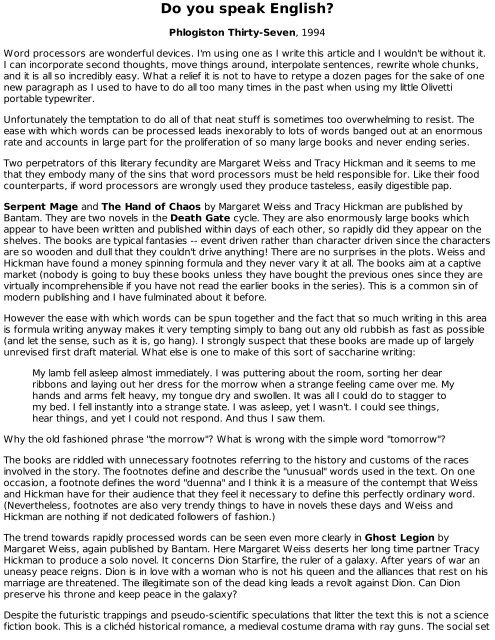Triffids Beard 2 - The Bearded Triffid
Triffids Beard 2 - The Bearded Triffid
Triffids Beard 2 - The Bearded Triffid
You also want an ePaper? Increase the reach of your titles
YUMPU automatically turns print PDFs into web optimized ePapers that Google loves.
Do you speak English?<br />
Phlogiston Thirty-Seven, 1994<br />
Word processors are wonderful devices. I'm using one as I write this article and I wouldn't be without it.<br />
I can incorporate second thoughts, move things around, interpolate sentences, rewrite whole chunks,<br />
and it is all so incredibly easy. What a relief it is not to have to retype a dozen pages for the sake of one<br />
new paragraph as I used to have to do all too many times in the past when using my little Olivetti<br />
portable typewriter.<br />
Unfortunately the temptation to do all of that neat stuff is sometimes too overwhelming to resist. <strong>The</strong><br />
ease with which words can be processed leads inexorably to lots of words banged out at an enormous<br />
rate and accounts in large part for the proliferation of so many large books and never ending series.<br />
Two perpetrators of this literary fecundity are Margaret Weiss and Tracy Hickman and it seems to me<br />
that they embody many of the sins that word processors must be held responsible for. Like their food<br />
counterparts, if word processors are wrongly used they produce tasteless, easily digestible pap.<br />
Serpent Mage and <strong>The</strong> Hand of Chaos by Margaret Weiss and Tracy Hickman are published by<br />
Bantam. <strong>The</strong>y are two novels in the Death Gate cycle. <strong>The</strong>y are also enormously large books which<br />
appear to have been written and published within days of each other, so rapidly did they appear on the<br />
shelves. <strong>The</strong> books are typical fantasies -- event driven rather than character driven since the characters<br />
are so wooden and dull that they couldn't drive anything! <strong>The</strong>re are no surprises in the plots. Weiss and<br />
Hickman have found a money spinning formula and they never vary it at all. <strong>The</strong> books aim at a captive<br />
market (nobody is going to buy these books unless they have bought the previous ones since they are<br />
virtually incomprehensible if you have not read the earlier books in the series). This is a common sin of<br />
modern publishing and I have fulminated about it before.<br />
However the ease with which words can be spun together and the fact that so much writing in this area<br />
is formula writing anyway makes it very tempting simply to bang out any old rubbish as fast as possible<br />
(and let the sense, such as it is, go hang). I strongly suspect that these books are made up of largely<br />
unrevised first draft material. What else is one to make of this sort of saccharine writing:<br />
My lamb fell asleep almost immediately. I was puttering about the room, sorting her dear<br />
ribbons and laying out her dress for the morrow when a strange feeling came over me. My<br />
hands and arms felt heavy, my tongue dry and swollen. It was all I could do to stagger to<br />
my bed. I fell instantly into a strange state. I was asleep, yet I wasn't. I could see things,<br />
hear things, and yet I could not respond. And thus I saw them.<br />
Why the old fashioned phrase "the morrow"? What is wrong with the simple word "tomorrow"?<br />
<strong>The</strong> books are riddled with unnecessary footnotes referring to the history and customs of the races<br />
involved in the story. <strong>The</strong> footnotes define and describe the "unusual" words used in the text. On one<br />
occasion, a footnote defines the word "duenna" and I think it is a measure of the contempt that Weiss<br />
and Hickman have for their audience that they feel it necessary to define this perfectly ordinary word.<br />
(Nevertheless, footnotes are also very trendy things to have in novels these days and Weiss and<br />
Hickman are nothing if not dedicated followers of fashion.)<br />
<strong>The</strong> trend towards rapidly processed words can be seen even more clearly in Ghost Legion by<br />
Margaret Weiss, again published by Bantam. Here Margaret Weiss deserts her long time partner Tracy<br />
Hickman to produce a solo novel. It concerns Dion Starfire, the ruler of a galaxy. After years of war an<br />
uneasy peace reigns. Dion is in love with a woman who is not his queen and the alliances that rest on his<br />
marriage are threatened. <strong>The</strong> illegitimate son of the dead king leads a revolt against Dion. Can Dion<br />
preserve his throne and keep peace in the galaxy?<br />
Despite the futuristic trappings and pseudo-scientific speculations that litter the text this is not a science<br />
fiction book. This is a clichéd historical romance, a medieval costume drama with ray guns. <strong>The</strong> social set


